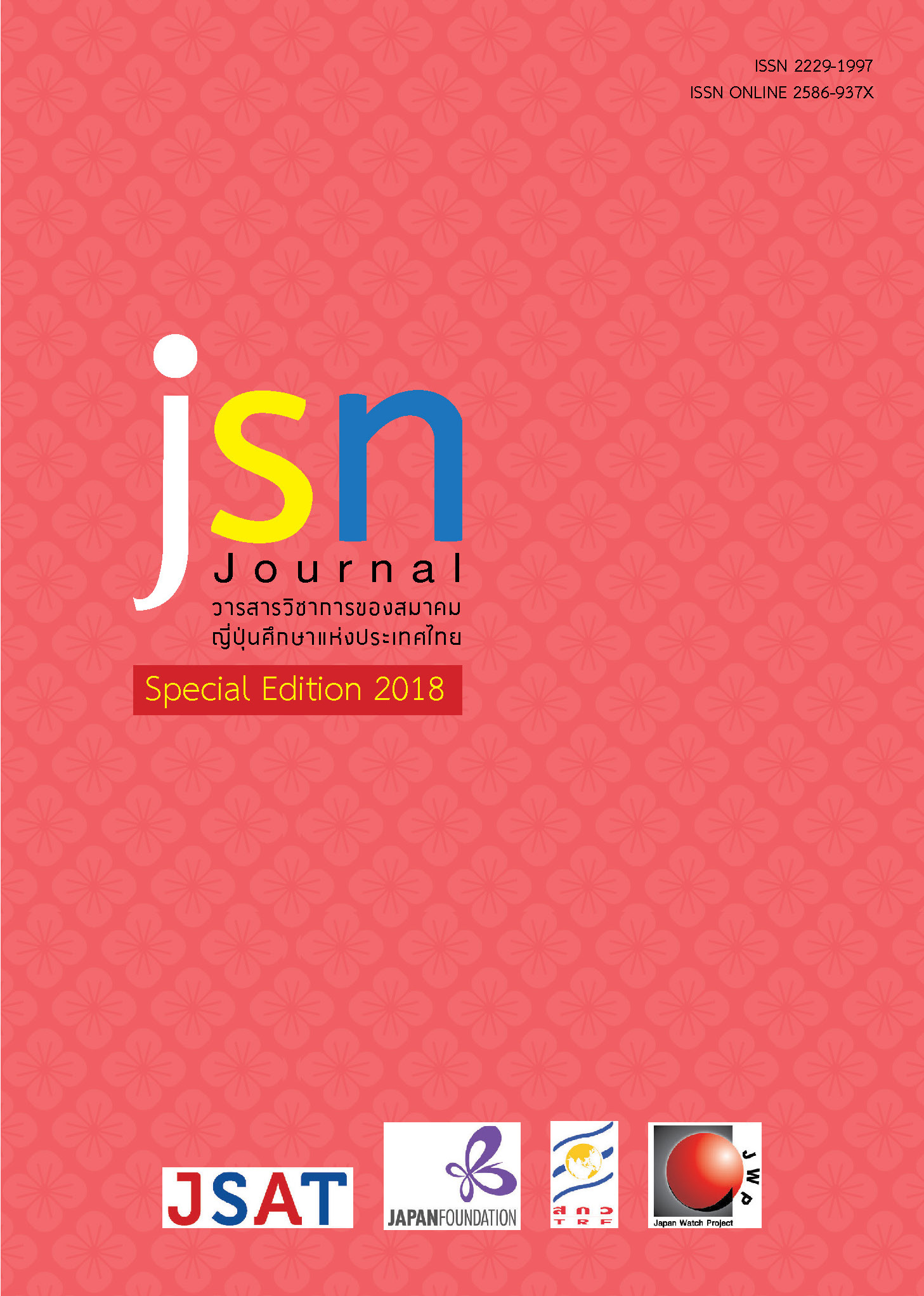Issues Related to Internship Practices among Thammasat University’s Students Majoring in Japanese Language
Main Article Content
Abstract
Personnel with multifaceted skills and internationally recognized competencies are being sought after in the labor market. Recognizing that an education focusing exclusively on theory or classroom learning can no longer contribute to the development of capabilities needed for real-world employment, the Japanese Section, Faculty of Liberal Arts, Thammasat University introduced an internship program into its curriculum in 2014. This study identifies issues related to internship practices among Thammasat University’s students majoring in Japanese language. It focuses on skills needed to be acquired over the course of enrollment as well as those needed to be supplemented post-internship. These identified skills will be used as a guideline for skill development scheme that seeks to prepare students for real-world employment. Survey questionnaire, in-depth interview, report-based data collection, students’ in-class presentation, and company visits are employed as research tools. Research results reveal that the five most necessary skills that should be nurtured over the course of enrollment are: (a) communication skills; (b) language skills; (c) eagerness/enthusiasm; (d) teamwork spirit; and (e) jobrelated basic knowledge and skills. Moreover, the four skills currently identified as underdeveloped and should be further nurtured and followed up by the Japanese Section are: (a) language skills; (b) skills in information technology; (c) knowledge in business; and (d) managerial and problem-solving skills.
Article Details
ข้อความและข้อคิดเห็นต่างๆ ในบทความเป็นของผู้เขียนบทความนั้นๆ ไม่ใช่ความเห็นของกองบรรณาธิการหรือของวารสาร jsn Journal
References
ทัศนีย์ เมธาพิสิฐ และ YUMIKO YAMAMOTO. (2560). การพัฒนาบุคลากรที่มีศักยภาพการทำงานระดับสากล: การเตรียมความพร้อมการฝึกงานในต่างประเทศ. วารสารเครือข่ายญี่ปุ่นศึกษา, 7(2), 83-100.
แผนพัฒนาการศึกษาระดับอุดมศึกษา ราชกิจจานุเบกษา เล่ม ๑๓๒ ตอนพิเศษ ๒๙๕ ง, ๑๓ พฤศจิกายน ๒๕๕๘ , “ประกาศกระทรวงศึกษาธิการ เรื่อง เกณฑ์มาตรฐานหลักสูตรระดับปริญญาตรี พ.ศ. ๒๕๔๘” น. 2-11.
ศิริวรรณ มุนินทรวงศ์ และ ทัศนีย์ เมธาพิสิฐ. (2559). ทิศทางการพัฒนาทรัพยากรบุคคลเพื่อ ผู้ประกอบการญี่ปุ่นในไทยในศตวรรษที่ 21.วารสารเครือข่ายญี่ปุ่นศึกษา, 5(2), 48-69.
Nareenoot Damrongchai. (2013). Japanese Speaking Personnel Proficiency Deficiencies: A Case Study of Japanese Education in Thailand. Journal of Language Teaching and Research, 4(2), 348-356. March 2013. Academy Publisher.
Tasanee Methapisit (2017) 「海外インターンシップのための人材育成に向けた日本語指導の 改善案」2017年東京外国語大学国際日本研究センター夏季セミナー&サマースクール2017.7.14発表資料より
中小企業基盤整備機構 (2006)「 タイにおける日系中小企業の経営課題に関する実態調査」独 立行政法人中小企業基盤整備機構
日本貿易振興機構(ジェトロ)(2017).「タイ日系企業進出動向調査 2017年」Retrieved from https://www.jetro.go.jp/ext_images/_Reports/01/762117c2abed4a1c/20170074_summary.pdf
平成25年度産業経済研究委託事業「社会人基礎力育成の好事例の普及に関する調査」Retrieved from http://www.meti.go.jp/policy/kisoryoku/25fy_chosa/Kiso_30sen_houkokusyo.pdf
平成25年度産業経済研究委託事業「社会人基礎力育成の好事例の普及に関する調査」Retrieved from http://www.meti.go.jp/policy/kisoryoku/25fy_chosa/Kiso_30sen_houkokusyo.pdf


